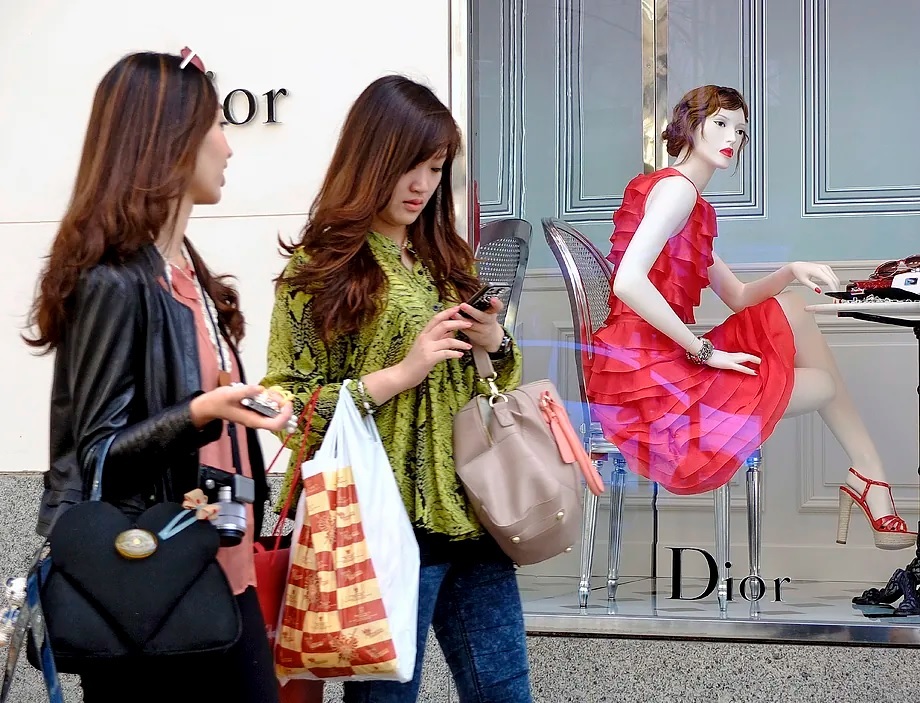At the El Corte Inglés de Nuevos Ministerios store in Madrid, a young Chinese couple meets with a tourist, also of Chinese nationality, to go shopping. Before entering, the guy takes out a stack of 50 euro bills from his fanny pack, puts them in an envelope, and hands it to the tourist. The couple waits outside while the other woman heads to the Gucci and Louis Vuitton stores. She buys a 2,300 euro bag and another 600 euro one with the cash. When paying, she asks the staff at both establishments for the receipt to be able to request the VAT refund through the Tax Free system, applicable to all tourists not residing in a European Union country.
The next day, the Chinese couple meets the tourist again, this time at the tax office at Terminal 4 of Barajas Airport, where they receive a 21% refund of what they paid for the luxury handbags, a total of 609 euros. The couple had agreed with the woman that she would keep 60% of that refund, 365 euros, and that she would take the two bags back to China. Later, back at home, a delivery person would pick up the items to deliver them to their true owner, a lady who had ordered the purchase in Madrid through the Chinese couple.
The business goes like this: a buyer in China contacts an intermediary in Spain to acquire luxury products from famous Western brands because they are much cheaper than in the Asian country. These intermediaries, based in Spain, find a Chinese tourist to personally make the purchase and take the items back to China. Everyone wins. The tourist earns a good commission from the tax refund. The intermediary, who has been paid in advance by the client in China, takes the other part of those taxes plus a commission charged to the final buyer, who still gets a Louis Vuitton, Dior, or Gucci product much cheaper than it would cost in their country. There are several Chinese or Chinese descent citizens residing in Spain who are involved in this scheme.
In Madrid, the Chinese couple, children of migrants who arrived in the early 2000s, have been so successful in the four years they have been doing this that they left their jobs to exclusively dedicate themselves to buying luxury products and sending them to China. Clients contact them through social networks. Just like many tourists interested in earning a commission by acting as couriers, while other times it is the couple who recruit tourists by reviewing posts of Chinese people on vacation in Madrid. The couple receives payment in yuan and then exchanges it to euros with a compatriot. All clean and undeclared.
Earlier this year, a Chinese tourist, who had collaborated on a couple of previous trips with the couple, contacted them because she was going to spend a few days in Madrid and offered to carry luxury items back to China in her suitcase. But this time, for the first time, they replied that they have not had clients for some time. "Suddenly, our contacts from China stopped reaching out to us. Other people who do the same in Spain have also seen their business decline lately. It seems that in China, our usual clients who were mostly from the middle class, no longer want to buy luxury products. There is a lot of uncertainty because the economy is not doing as well as before and people have less money or prefer to save," they explained.
Many Chinese consumers have withdrawn from the luxury market, which is not at its best moment in the Asian giant. Last year, according to a report by the consulting firm Bain & Co, sales plummeted by 20% and in cities like Shanghai, the financial capital, stores of Prada, Gucci, Louis Vuitton, Chanel, Tiffany, and Bulgari closed. Luxury watches and jewelry were the most affected by the spending slowdown, with a sales drop of over 30%.
After China has been the main driver of global luxury market growth over the past decade, now economic turbulence (real estate crisis, indebted local governments, decreasing foreign investment, high youth unemployment...) is undermining consumer confidence, especially of the growing middle class, which in 2024, according to official data, surpassed the 500 million people mark in China considering annual incomes ranging from 100,000 to 500,000 yuan (from 13,000 to 66,000 euros).
"According to a 2021 study on the consumption habits of Chinese millennial middle-class, 7.6 million young people spent an average of 71,000 yuan (8,700 euros) on luxury items, approximately 30% of the global luxury market. Now it seems they are changing course and that spending has been put on hold due to financial anxiety," explained researcher Christian Yao from Victoria University of Wellington in an analysis published in The Conversation.
The wealthy, although they have become more thrifty after the pandemic, continue to spend on luxury. But it is that middle class, once obsessed with publicly displaying their Louis Vuitton or Rolex, that no longer buys as many brand handbags or watches as before, not even seeking cheaper alternatives like buying items in Europe or on the Chinese island of Hainan, transformed into a duty-free commercial zone to attract precisely this profile of buyers, which saw sales drop by 29% last year. Analysts point out that the decline is likely to persist this year in major Chinese cities.
